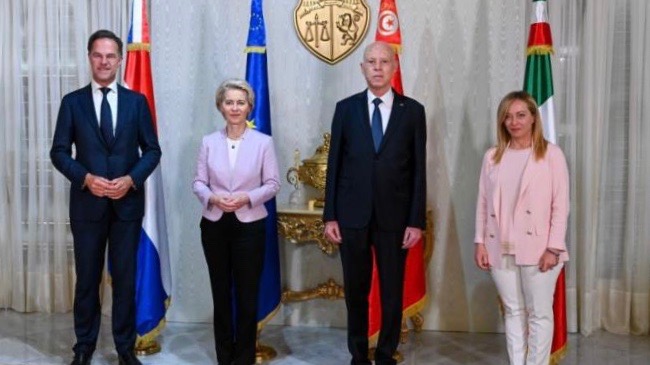The Workers’ Party of Tunisia and several human rights groups have strongly objected to a deal proposed by European countries on the movement of migrants. They have called it a violation of Tunisian sovereignty and the human rights of refugees.
The Tunisian Workers Party claimed in a statement on June 15 that any such deal will make Tunisia a “policeman” patrolling its borders so that people trying to escape their deteriorating economic conditions can be stopped from going to Europe and punished.
On June 11, EU’s top officials, including President of the EU Commission Ursula Von Der Leyen as well as Italian Prime Minister Giorgia Meloni and Dutch Prime Minister Mark Rutte, visited Tunisia and issued a joint statement after meeting President Kais Saied, saying that both the parties have agreed to work jointly to end “irregular migration.”
Critics of the deal claim that the EU is using Tunisia’s precarious economic condition to force it to control the movement of migrants across the Mediterranean sea to Italy and Greece in exchange for financial support, just like they did with Turkey and Libya.
IMF deal in exchange of border control
Reports indicate that the EU is pushing Tunisia to establish an harsh border control policy in exchange for its support to the country’s stalled bid to obtain a USD 1.9 billion loan from the International Monetary Fund (IMF).
Tunisia’s loan has been stalled for months due to President Kais Saied’s reluctance to implement the reforms demanded by the IMF. Saied is reportedly worried that his government—already facing large-scale popular resistance since his political coup in July 2021—will face another popular upsurge if the IMF’s demands to cut subsidies for essential commodities such as flour and fuel, divestment, and privatization are implemented.
EU leaders are concerned that the deteriorating Tunisian economy may create a fresh round of refugees. According to an AP report, the EU leaders offered 1.05 billion euros (USD 1.1 billion) aid to Tunisia. This includes 100 million euros for Tunisia’s border control.
According to TAP, migration is one of the four major areas of cooperation identified in the joint statement issued after the meeting between Saied and the EU leaders on June 11. It says that, “as part of our joint work on migration, the fight against irregular migration to and from Tunisia and the prevention of loss of life at sea, is a common priority, including fighting against smugglers and human traffickers, strengthening border management, registration and return.”
In a press conference after the meeting, Dutch Prime Minister Rutte emphasized that “migration is at this moment one of the most important issues facing all of us.” He claimed that the EU and Tunisia have “made an excellent agreement” to “kill that cynical business model of the boat smugglers.” In return, he promised increased “economic and development” cooperation between his country and Tunisia.
Meloni, who was on a second trip to Tunisia in less than a week, also referred to the migration cooperation agreement, saying that “we consider this work [migration agreement] useful also to help Tunisia in its negotiations with the IMF for the framework agreement that remains a priority for the stability and the growth for the country.”
In turn, Saied, during a telephonic conversation last week with the head of the EU Council Charles Michel, proposed an international conference of all the parties affected by “irregular” migration. He also said that “Tunisia refuses to be a place of transit or settlement for migrants.”
EU trying to blackmail and haggle Tunisia
Referring to the repeated visits by EU officials to the country, the Tunisian Forum for Economic and Social Rights (FTDES) called them “conceal[ed] blackmail and an attempt to haggle” Tunisia which is offered “money and aid in exchange for [its role as a] border policeman.”
The FTDES statement claimed that “Europe has not seen Tunisia as a country in need of cooperation based on genuine democracy guaranteeing rights and freedoms, but merely as an advanced border point requiring more equipment to contain immigration, with the aim that no one should be able to reach Europe,” AP reported.
Right groups, including Alarm Phone, had also demonstrated during Meloni’s first visit to Tunisia earlier last week, calling out her anti-immigration rhetoric and her government’s policies regarding refugees. The groups claim that despite repeated references to “human rights” during the EU leaders’ press conference in Tunisia, border control would inevitably translate into increased human rights abuses of migrants and asylum seekers.
Saied is already facing allegations of racism following his order to halt “illegal migrantion” in February. He had said that migrants from Sub-Saharan Africa were part of a campaign to change Tunisia’s demographic profile.
Following Saied’s utterances, there was an uptick in racist violence in Tunisia, particularly against migrants from Sub-Saharan Africa, forcing more people to cross the sea. This may be one of the factors that is contributing to a spike in accidents involving migrant ships in the Central Mediterranean.
According to UN data quoted by Reuters, more than 50% of all migrants (over 51,000) who reached Italy this year so far came through or from Tunisia. The figure for the same period last year was just 3,658.
The push for the deal with Tunisia was expedited after European countries agreed on a common policy on “unauthorized” migrants in a meeting of the 27-member bloc in Luxembourg on June 9.
Violating their commitments to the international law of refugees, most of the countries in Europe are reluctant to host them, using the excuse of economic and social issues and the rise of right-wing groups.





